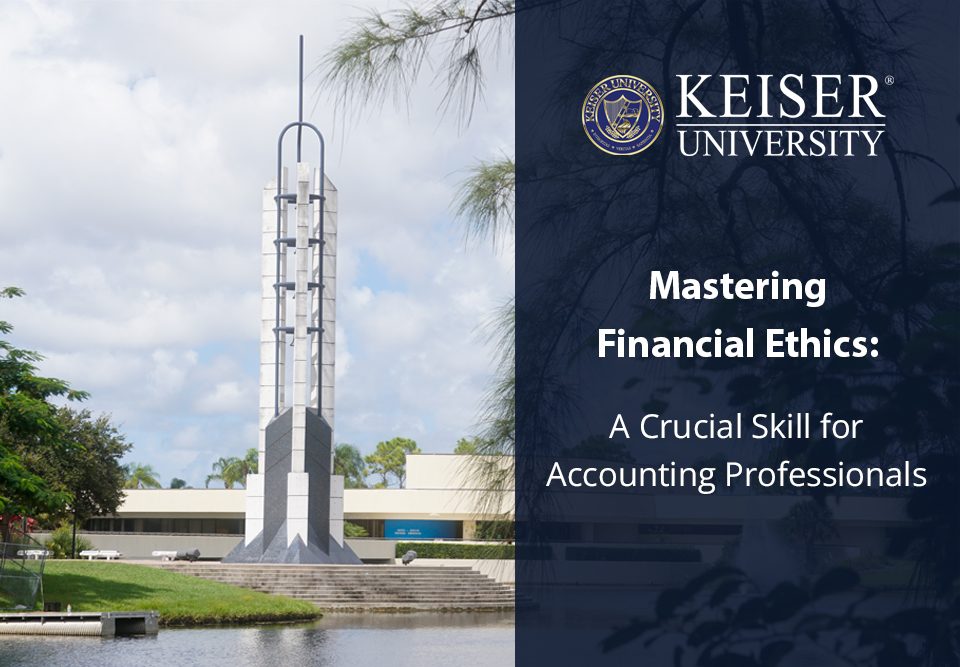Working in the field of accounting often means handling sensitive financial data and even personal information. Unfortunately, this access to sensitive information also comes with the risk for abuse, dishonesty, or even data manipulation.
With so much on the line, accounting professionals must adhere to strong ethical standards when they perform their jobs each day. By having a better understanding of what financial ethics are, what they entail in accounting and how financial ethics are taught, current and aspiring accountants can enhance their professional competence and do their jobs with greater confidence.
What Are Financial Ethics in Accounting?
Financial ethics in accounting refer to the key pillars of ethical conduct for those working in the field. These include integrity, transparency, and accountability in all professional actions. Accounting ethics include professional competence and due care and confidentiality when working with a client’s potentially sensitive financial or personal information.
All accounting and finance professionals are expected to adhere to these basic ethical concepts to prevent fraudulent practices and common ethical dilemmas in the workplace.
Importance of Ethics in Accounting and Finance
There are various reasons as to why ethics are so important among those working in accounting and finance. For starters, accountants deal with sensitive information regularly that may include bank account numbers, social security numbers and even employee tax records. If this information ends up in the wrong hands, the client’s information could be at stake. In this sense, accountants have an ethical duty to keep information secure and to only use sensitive information as it is intended to be used.
Meanwhile, ethical accounting practices can help minimize legal risks by ensuring that proper procedures, diligence and rules are followed. Adhering to solid financial ethics and ethical accounting processes helps professionals avoid legal problems while maintaining a strong reputation in the field.
Ethics and the Code of Conduct
While there is not a university code of conduct for all accounting professionals, different committees and other professional associations within the field have and enforce their codes of conduct and codes of ethics.
For example, the IESBA maintains a Code of Ethics for Professional Accountants that can be broken down into five key principles, including:
- Integrity
- Objectivity
- Professional competence and due care
- Confidentiality
- Professional behavior
In addition, the AICPA upholds its own professional ethics code of conduct that has been updated and revised many times over the years. You can view the latest version here.
The SEC also has a code of ethics and ethical standards, which include:
- Honest and ethical conduct
- Timely and truthful disclosure
- Legal compliance
- Confidentiality
In order to belong to a professional organization in accounting, professionals must agree to adhere to the association’s code of ethics or code of conduct.
Ethical Issues in Accounting and Finance
Working in the finance or accounting field comes with some inherent ethical issues that you can expect to face at some point during your career. For example, it is not uncommon for businesses and individuals alike to present accountants with falsified or otherwise inaccurate financial information or reporting. This, in turn, can put accountants in a difficult position to report the inaccuracies and risk losing the client.
Conflicts of interest can also create ethical dilemmas in the accounting field, as can pressure or bribery directly from a client or from the accountant’s employer. At the end of the day, accountants and finance professionals need to fall back to their code of ethics and do what is right.
How Are Ethics Utilized?
Throughout the accounting field, ethical principles are regularly used to improve objectivity and trust between clients and accounting professionals.
H3: Principles
Basic principles of ethical behavior are utilized in the accounting field, especially in developing a code of ethics or ethical standards. Some examples of ethical principles that may be valued in accounting and finance include:
- Integrity
- Honesty
- Transparency
- Confidentiality
Rules and Guidance
From there, more detailed rules and guidelines can be developed that are based on ethical standards and principles already laid out. Sometimes, this may be referred to as a code of ethics or ethical guidelines. This should be a document that includes very specific rules for ethical behavior as well as examples of violations and potential consequences. With solid rules and guidance in place, all accountants within an organization can be on the same page in understanding ethical standards and expectations.
Advantages and Benefits
Ultimately, accountants are able to adhere to financial ethics and ethical behavior when they can see the advantages and benefits for themselves. Engaging in ethical behavior as an accountant means maintaining your reputation as a trustworthy and reliable professional. This can lead to more clients and a more established identity in the field.
Meanwhile, adhering to ethical standards in accounting can help accountants and their clients avoid legal repercussions that can accompany common ethical dilemmas.
Training for Financial Ethics
For new and aspiring accountants, individual employers may have their own systems for providing financial ethics training. Depending on the professional association(s) you join, you may also receive additional ethics training.
Regardless, there are a few components you can expect to find in your accounting ethics training that can help you work to the highest ethical standards and professional competence.
Implement Checks and Balances
First and foremost, a system of checks and balances is key in maintaining accounting ethics. Specifically, checks and balances ensure that several different people are involved in an accounting transaction and all accounting processes. This can help reduce the risk of fraud and other ethical dilemmas.
With a system of checks and balances, an accounting firm may require that receipts and deposits be handled separately from the recording and reconciliation of accounts. Additionally, a strong system of checks and balances should include plans for regular reviews and approvals so that no single employee can make a major decision or complete a transaction without approval from others.
Open Communication
As part of accounting ethics training, accounting professionals should also be taught the value of open and honest communication, not just among employees but also between employees and management as well. Higher ups should encourage employees to say something if they notice anything suspicious while ensuring that any so-called whistleblowers will be protected and supported. At the end of the day, accountants need to feel safe and respected by their employers so they will feel compelled to do the right thing when another accountant is making bad choices.
Ideally, accounting firms should offer a reporting system for employees that makes it easy and anonymous to report ethical offenses within the company.
Integrity
All accounting professionals should consider integrity one of the most essential characteristics of the job. Accountants need to understand that without a strong sense of integrity in their work, they simply cannot follow ethical behavior and ethical standards. Likewise, employers must emphasize the importance of integrity in their own dealings; this may mean having a zero-tolerance policy in the office for dishonesty. If an employee is found to be engaging in behaviors or practices that go against the company’s code of ethics, then that employee should face immediate consequences that may involve termination and possible legal action (depending on the severity of the offense).
Transparency
Finally, accounting professionals should be taught the importance of transparency when it comes to ethical behavior and upholding high ethical standards in the workplace. One of the best ways to achieve a high level of transparency in this field is to establish and enforce a code of ethics within the business itself. This way, everyone can be on the same page regarding what is considered ethical behavior and what needs to be reported as an ethics violation.
The Bottom Line on Accounting Ethics and Growing Your Career
There’s no denying the importance of holding yourself (and other professionals) to the highest ethical standards in the accounting field. With proper ethical behavior, clients can rest assured their information is safe and they are receiving the most objective and accurate financial information. All of this, in turn, improves transparency and accountability throughout the practice while boosting your own integrity.
If you’re serious about taking your accounting career to new heights, it may be time to pursue an advanced degree. Keiser University offers graduate-level accounting and business and finance degrees to suit your interests, all focusing on objectivity and accounting ethics. From our Master of Accountancy program and Master of Business Administration in Accounting program to our Master of Science in Financial Technology program, Keiser University has options to help you advance your career. Learn more or get in touch with a graduate admissions counselor to get started.






 The instructors at Keiser University impacted my life. They believed in my ability to become a great graphic designer, regardless of how I felt about my skills. KU helped to prepare me for the real world and got me to where I am today.
The instructors at Keiser University impacted my life. They believed in my ability to become a great graphic designer, regardless of how I felt about my skills. KU helped to prepare me for the real world and got me to where I am today.
